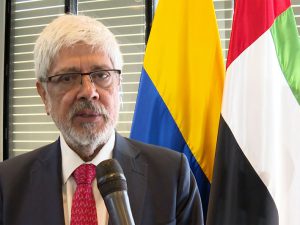BOGOTÁ / WAM
Germán Umaña Mendoza, Minister of Trade, Industry, and Tourism of Colombia, said that his country, under the framework of the Comprehensive Economic Partnership Agreement (CEPA) with the UAE, aims to attract investments estimated at between US$600-700 million in the green hydrogen and digital economy sectors. This will drive their investment cooperation and provide promising investment opportunities for their business communities, he explained.
In his statement today to the Emirates News Agency (WAM) on the sidelines of the signing of the CEPA between the two countries in the Colombian capital, Bogota, Mendoza affirmed that the CEPA will enhance the trade and investment cooperation between the two countries, with the participation of their private sectors in business, services, trade, investment, and other vital sectors that will have a positive economic impact.
He stressed his country’s keenness to bolster its overall cooperation with the UAE, most notably in economic areas and in responding to the challenges caused by climate change worldwide.
“The CEPA will help achieve added value for the economies of the two countries, as it promotes the export of goods and raw materials that Colombia can provide to the UAE, while enabling the latter to access the services market in Colombia, such as its transportation sector and the digital economy and everything related to infrastructure investments, which will become available to Emirati investors,” Mendoza said.
The agreement will help promote the exchange of goods and services between the two countries, enable them to adopt environmental biodiversity standards and focus on nature reserves, provide many opportunities for their business communities and private sectors and open a new trade corridor between South America and the Middle East, which are key markets with more than 800 million consumers, he added.
Once implemented, the CEPA will eliminate or reduce tariffs on most product lines, as well as remove unnecessary trade barriers. It also aims to enhance market access and foster cooperation across various sectors, including digital trade, financial services, communications, energy, the environment, hospitality, tourism, infrastructure, agriculture, and food production.
 The Gulf Time Newspaper One of the finest business newspapers in the UAE brought to you by our professional writers and editors.
The Gulf Time Newspaper One of the finest business newspapers in the UAE brought to you by our professional writers and editors.
